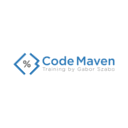Setting up Continuous Integration with Jenkins
This, along with the other courses can be given either on-site in the offices of the client or on-line via Zoom or other means. Contact Gabor Szabo for more details.
Goals
- Understand the role of Continuous Integration in the life-cycle of software projects.
- Create simple Jenkins jobs with and without pipelines
Audience
- Developers
- QA engineers
- DevOps engineers
- Automation engineers
Prerequisites
- Basic understanding of Linux.
- Understanding of the software development process.
- Bring your own computer where you installed and where you have the rights to install new software.
Course format
- 8 academic hours. (Two half-days or a full day)
Syllabus
Install Jenkins master
- Install Jenkins on a local Linux system or on a cloud based VPS.
- Install the default plugins
- Install additional plugins
- Configuration of Jenkins
- Backup of Jenkins
- User administration in Jenkins
Create a simple Jenkins Job
- Create a Jenkins job that runs a shell script on Unix
- Schedule a job based on polling.
- Schedule a job based on timer.
- Schedule a job based on trigger.
Create a Pipeline job
- Create a job using Pipelines manually
- Add several stages to the pipeline
- Use plugins to enhance the pipeline
- Sequencial and parallel steps in a Jenkins pipeline
- Post stages of pipelines
- The pipeline editor
- Blue Ocean
Install Jenkins agent
- Install Jenkins agent
- Configure jobs to run on the agent
- Limit the number of processes on the agent
Introduction to Groovy
- Basic Groovy commands that can be used in Jenkins pipelines
Jenkins and Git
- Connecting Git and Jenkins
- Running Jenkins from Git
Resources
If you are interested in this course, contact Gabor Szabo for more details.
